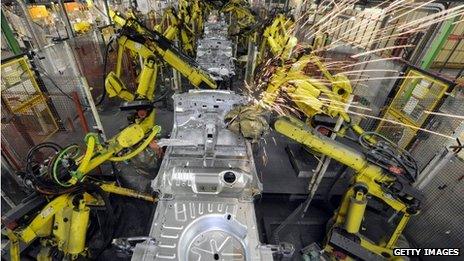Eurozone business growth slows
- Published

Markit said growth was "broad-based" across the eurozone
The pace of growth among businesses in the eurozone eased in October as the service sector slowed, a survey has indicated.
The preliminary Purchasing Managers' Index (PMI) from research firm Markit fell to 51.5 from 52.2 in September.
However, a reading above 50 still implies expansion, and activity has now grown for four months in a row.
Markit said expansion was "broad-based" across the eurozone, although growth slowed in both Germany and France.
Germany - which has been the main economic powerhouse for the eurozone in recent years - saw growth slow to a three-month low.
Markit also noted that the eurozone's jobs market remained weak. Employment fell for the 22nd month in a row, with the rate of job losses picking up from September.
"The survey data have been running in positive territory for four consecutive months now and indicate that the eurozone economy expanded at a quarterly rate of 0.2% at the start of the fourth quarter, suggesting an ongoing, albeit sluggish, recovery," said Chris Williamson, chief economist at Markit.
Slow improvement
Spain's economy - which was one of the hardest hit by the credit crunch and subsequent economic downturn - has shown signs this week that it is slowly starting to recover.
Official figures show the country's unemployment rate - which is one of the highest in Europe - fell slightly in the third quarter of this year, to 26% from 26.3% in the previous quarter.
On Wednesday, the Bank of Spain said the country's economy had emerged from recession after growing for the first time in more than two years.
The bank estimated that Spain's economy grew by 0.1% between July and September.
The eurozone emerged from recession in the second quarter of this year when it grew by 0.3% following a record 18 months of economic contraction.
However, earlier this month, European Central Bank (ECB) president Mario Draghi said the recovery in the bloc remained "weak, fragile, uneven".
He said further support for the banking sector could not be ruled out, and that the ECB was "ready to consider all available instruments" to maintain financial stability and ensure that recovery in the eurozone took hold.
There has been speculation that the ECB might offer another round of cheap, long-term loans to banks to keep the cost of credit down.
- Published23 October 2013
- Published14 October 2013
- Published2 October 2013